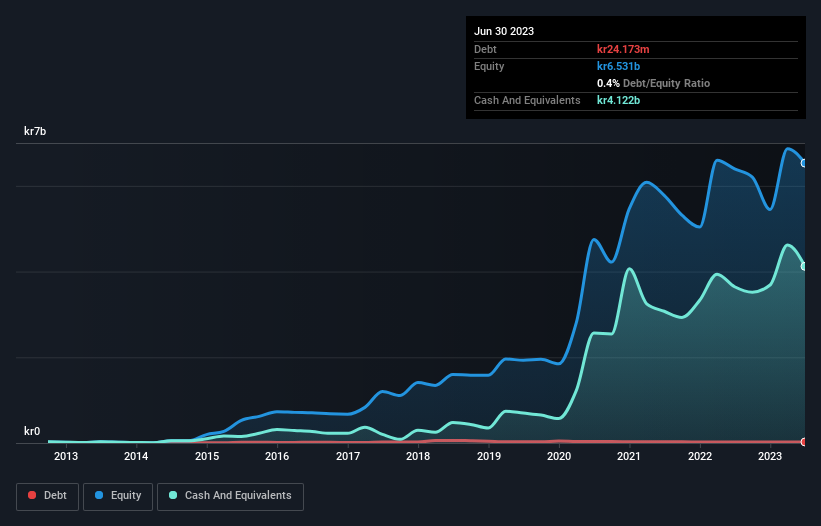
Warren Buffett famously said, 'Volatility is far from synonymous with risk.' So it might be obvious that you need to consider debt, when you think about how risky any given stock is, because too much debt can sink a company. We note that Nel ASA (OB:NEL) does have debt on its balance sheet. But the more important question is: how much risk is that debt creating?
When Is Debt A Problem?
Generally speaking, debt only becomes a real problem when a company can't easily pay it off, either by raising capital or with its own cash flow. Part and parcel of capitalism is the process of 'creative destruction' where failed businesses are mercilessly liquidated by their bankers. However, a more common (but still painful) scenario is that it has to raise new equity capital at a low price, thus permanently diluting shareholders. Of course, the upside of debt is that it often represents cheap capital, especially when it replaces dilution in a company with the ability to reinvest at high rates of return. When we think about a company's use of debt, we first look at cash and debt together.
See our latest analysis for Nel
What Is Nel's Net Debt?
As you can see below, at the end of June 2023, Nel had kr24.2m of debt, up from kr22.8m a year ago. Click the image for more detail. But on the other hand it also has kr4.12b in cash, leading to a kr4.10b net cash position.

How Healthy Is Nel's Balance Sheet?
We can see from the most recent balance sheet that Nel had liabilities of kr1.35b falling due within a year, and liabilities of kr342.3m due beyond that. Offsetting these obligations, it had cash of kr4.12b as well as receivables valued at kr742.7m due within 12 months. So it actually has kr3.17b more liquid assets than total liabilities.
It's good to see that Nel has plenty of liquidity on its balance sheet, suggesting conservative management of liabilities. Given it has easily adequate short term liquidity, we don't think it will have any issues with its lenders. Succinctly put, Nel boasts net cash, so it's fair to say it does not have a heavy debt load! There's no doubt that we learn most about debt from the balance sheet. But ultimately the future profitability of the business will decide if Nel can strengthen its balance sheet over time. So if you're focused on the future you can check out this free report showing analyst profit forecasts.
In the last year Nel wasn't profitable at an EBIT level, but managed to grow its revenue by 65%, to kr1.4b. With any luck the company will be able to grow its way to profitability.
So How Risky Is Nel?
We have no doubt that loss making companies are, in general, riskier than profitable ones. And we do note that Nel had an earnings before interest and tax (EBIT) loss, over the last year. Indeed, in that time it burnt through kr1.1b of cash and made a loss of kr1.5b. While this does make the company a bit risky, it's important to remember it has net cash of kr4.10b. That means it could keep spending at its current rate for more than two years. Nel's revenue growth shone bright over the last year, so it may well be in a position to turn a profit in due course. By investing before those profits, shareholders take on more risk in the hope of bigger rewards. When analysing debt levels, the balance sheet is the obvious place to start. But ultimately, every company can contain risks that exist outside of the balance sheet. Case in point: We've spotted 2 warning signs for Nel you should be aware of.
When all is said and done, sometimes its easier to focus on companies that don't even need debt. Readers can access a list of growth stocks with zero net debt 100% free, right now.
If you're looking to trade Nel, open an account with the lowest-cost platform trusted by professionals, Interactive Brokers.
With clients in over 200 countries and territories, and access to 160 markets, IBKR lets you trade stocks, options, futures, forex, bonds and funds from a single integrated account.
Enjoy no hidden fees, no account minimums, and FX conversion rates as low as 0.03%, far better than what most brokers offer.
Sponsored ContentValuation is complex, but we're here to simplify it.
Discover if Nel might be undervalued or overvalued with our detailed analysis, featuring fair value estimates, potential risks, dividends, insider trades, and its financial condition.
Access Free AnalysisHave feedback on this article? Concerned about the content? Get in touch with us directly. Alternatively, email editorial-team (at) simplywallst.com.
This article by Simply Wall St is general in nature. We provide commentary based on historical data and analyst forecasts only using an unbiased methodology and our articles are not intended to be financial advice. It does not constitute a recommendation to buy or sell any stock, and does not take account of your objectives, or your financial situation. We aim to bring you long-term focused analysis driven by fundamental data. Note that our analysis may not factor in the latest price-sensitive company announcements or qualitative material. Simply Wall St has no position in any stocks mentioned.
About OB:NEL
Nel
A hydrogen company, provides solutions to produce, store, and distribute hydrogen from renewable energy in Norway and internationally.
Flawless balance sheet with limited growth.
Similar Companies
Market Insights
Community Narratives



